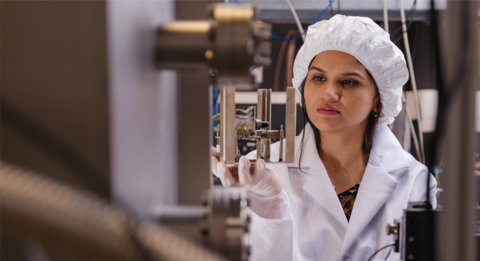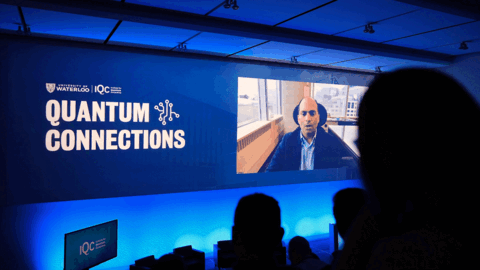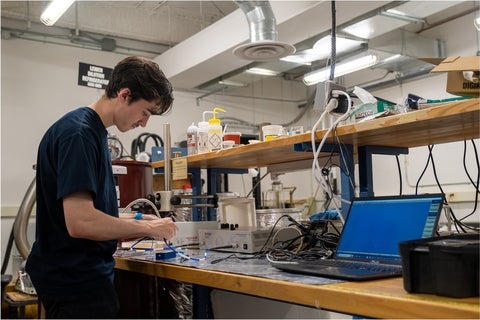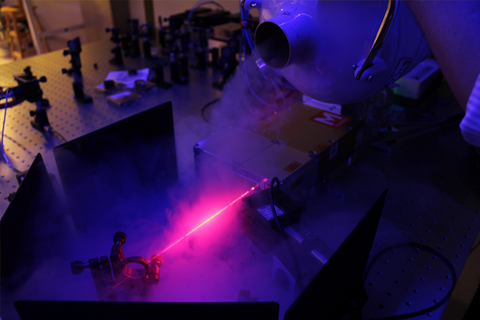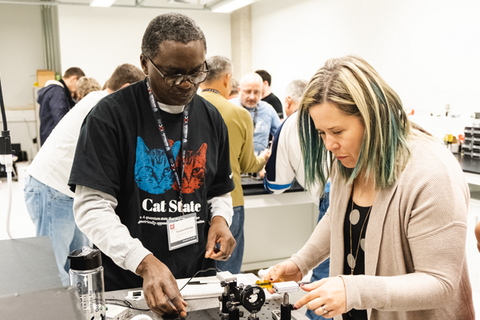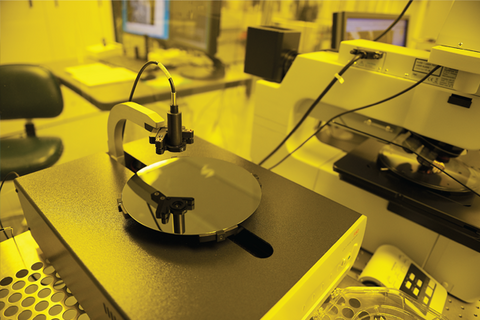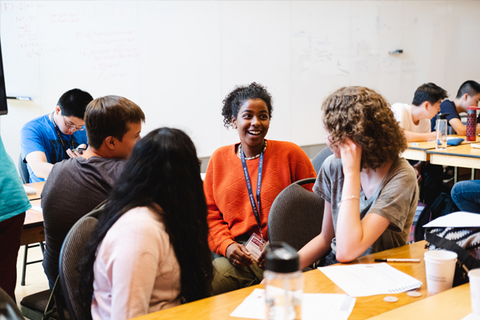News
IQC Welcomes Dr. Bradley Hauer
Breakthroughs in understanding how gravity affects quantum mechanics could be on the horizon at the Institute for Quantum Computing (IQC) with the addition of Dr. Bradley Hauer as IQC's newest faculty member and Assistant Professor in the Department of Electrical and Computer Engineering. Hauer’s research focuses on studying cavity optomechanical systems and superconducting circuits and their applications in metrology, quantum information and non-classical state preparation.
Entangling undergraduate students with quantum success
Each year, the Institute for Quantum Computing (IQC) invites top undergraduate students from around the world to the University of Waterloo for the opportunity to immerse themselves in quantum information science and technology. This program, the Undergraduate School on Experimental Quantum Information Processing (USEQIP), provides participants with lectures on quantum information theory and experimental approaches to quantum devices, as well as over 30 hours of hands-on laboratory and experimental exploration.
IQC is an international destination for quantum innovation
On World Quantum Day, the Institute for Quantum Computing celebrates progress and momentum.
Events
Two Prover Perfect Zero Knowledge for MIP*
CS/MATH Seminar - Kieran Mastel from IQC ZOOM + IN PERSON
Quantum-Nano Centre, 200 University Ave West, Room QNC 1201 Waterloo, ON CA N2L 3G1
The recent MIP*=RE theorem of Ji, Natarajan, Vidick, Wright, and Yuen shows that the complexity class MIP* of multiprover proof systems with entangled provers contains all recursively enumerable languages. In prior work Grilo, Slofstra, and Yuen showed (via a technique called simulatable codes) that every language in MIP* has a perfect zero knowledge (PZK) MIP* protocol. The MIP*=RE theorem uses two-prover one-round proof systems, and hence such systems are complete for MIP*. However, the construction in Grilo, Slofstra, and Yuen uses six provers, and there is no obvious way to get perfect zero knowledge with two provers via simulatable codes. This leads to a natural question: are there two-prover PZK-MIP* protocols for all of MIP*?
In this talk we answer the question in the affirmative. For the proof, we use a new method based on a key consequence of the MIP*=RE theorem, which is that every MIP* protocol can be turned into a family of boolean constraint system (BCS) nonlocal games. This makes it possible to work with MIP* protocols as boolean constraint systems, and in particular allows us to use a variant of a construction due to Dwork, Feige, Kilian, Naor, and Safra which gives a classical MIP protocol for 3SAT with perfect zero knowledge. To show quantum soundness of this classical construction, we develop a toolkit for analyzing quantum soundness of reductions between BCS games, which we expect to be useful more broadly. This talk is based on joint work with William Slofstra
Quantum Connections 2024: Quantum Perspectives
Join us for Quantum Connections May 1-2, 2024. This year we’re highlighting Quantum Perspectives: the impacts and outlooks driving our future.
IQC Student Seminar Featuring Alexander Frei
Fermionic encodings: BK Superfast, ternary trees, and even fermionic encodings
Quantum-Nano Centre, 200 University Ave West, Room QNC 1201 Waterloo, ON CA N2L 3G1
We give an introduction to fermionic encoding schemes applicable in the context of quantum simulation of fermionic systems in condensed matter physics, lattice gauge theories, and in quantum chemistry.
For this we will focus on the circuit depth overhead for a variety of constructions of fermionic encodings, more precisely in terms of their weight given by the choice of encoding within the Pauli group, and as such also in terms of their circuit depth due to multi-qubit rotation gates.
In particular we will introduce the Fenwick tree encoding due to Bravyi and Kitaev, as well as an optimal all-to-all encoding scheme in terms of ternary trees due to Jiang et al, and put those in perspective with the well-known fermionic encoding given by the Jordan-Wigner transformation. Such encoding schemes of fermionic systems with all-to-all connectivity become relevant especially in the context of molecular simulation in quantum chemistry.
We then further discuss the encoding of the algebra of even fermionic operators, which becomes particularly handy in the estimation of ground state energies for complex materials and their phase transitions in condensed matter physics.
In particular, we will introduce here the so-called Bravyi--Kitaev superfast encoding for the algebra of even fermionic operators, as well as the compact encoding due to Klassen and Derby as a particular variant thereof. These encoding schemes require the further use of stabilizer subspaces and so of fault-tolerant encoding schemes for their practical implementation for the purpose of quantum simulation. We then finish with a further improvement, the so-called supercompact encoding, due to Chen and Xu. In particular, we will focus here on its code parameters (more precisely its encoding rate and code distance) and put those in perspective with the previous compact encoding due to Klassen and Derby.
This talk is meant as an expository talk on available encoding schemes for fermionic systems, together with their best practices for the purpose of quantum simulations.
